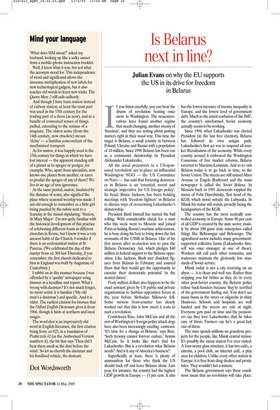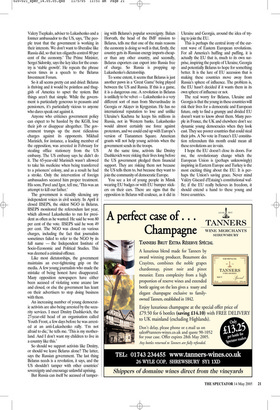Is Belarus next in line?
Julian Evans on why the EU supports the US in its drive for freedom in Belarus If you listen carefully, you can hear the drums of revolution beating once more in Washington. The neoconservatives have found another regime that needs changing, another enemy of ‘freedom’, and they are setting about putting matters right in their usual way. This time the target is Belarus, a small country in between Poland, Ukraine and Russia with a population of 10 million. Since 1996 Belarus has been run as a communist dictatorship by President Aleksander Lukashenko.
All the usual precursors to a US-sponsored ‘revolution’ are in place: an influential Washington NGO — the US Committee on Nato — has said that fostering democracy in Belarus is an ‘essential, moral and strategic imperative for US foreign policy’. Its head, Bruce Jackson, has been holding meetings with ‘freedom fighters’ in Belarus to discuss ways of overcoming Lukashenko’s dictatorship.
President Bush himself has started the ball rolling. With considerable cheek for a man who this week went to Moscow and joined Putin in hailing Russia’s wartime achievement, he is busy doing his best to bring down the last remnants of the USSR in Belarus. One of his first moves after re-election was to pass the Belarus Democracy Act, which pledges $40 million in federal support to the Belarus opposition. Like Jackson, Bush met dissident figures from Belarus in February and assured them that they would get the opportunity to exercise their democratic potential ‘in the nearest future’.
Forty million dollars also happens to be the exact amount given by US public and private organisations to Serbian opposition forces in the year before Slobodan Milosevic fell. Some neocon bean-counter has clearly worked out that this is how much it costs to start a revolution.
Condoleeza Rice, John McCain and all the rest of Washington’s foreign-policy attack dogs have also been increasingly snarling eastward. ‘It’s time for a change in Belarus,’ says Rice. ‘Such tyranny cannot forever endure,’ hymns McCain. So it looks like that’s that for Lukashenko. But is a revolution what Belarus needs? And it it any of America’s business?
Superficially at least, there is plenty of ammunition for those who think the US should back off and leave Belarus alone. Last year, for instance, the country had the highest GDP growth in Europe — 11 per cent. It also has the lowest measure of income inequality in Europe, and the lowest level of government debt. Much to the initial confusion of the IMF, the country’s unreformed Soviet economy actually seems to be working.
Since 1994, when Lukashenko was elected President (in the last free election), Belarus has followed its own unique path. Lukashenko’s first act was to suspend all market liberalisation of the economy. While every country around it embraced the Washington Consensus of free market reforms, Belarus reverted to Marxism-Leninism. And so to visit Belarus today is to go back in time, to the Soviet Union. The streets are still named Marx Avenue or Engels Boulevard and the main newspaper is called the Soviet Belarus. In Moscow back in 1991 democrats toppled the statue of Felix Dzerzhinsky, first head of the KGB, which stood outside the Lubyanka. In Minsk his statue still stands, proudly facing the headquarters of the KGB.
The country has the most centrally controlled economy in Europe. Some 80 per cent of all GDP is created by the state sector, mainly by about 100 giant state enterprises called things like Beltransgaz and Belenergo. The agricultural sector includes many governmentsupported collective farms (Lukashenko himself was once manager at one of these). Workers still call each other comrades, and waitresses maintain the gloriously low standards of Soviet service.
Minsk today is not a city teetering on an abyss — it is clean and well run. Rather than stopping you for bribes as they do in every other post-Soviet country, the Belarus police refuse back-handers because they’re terrified of the government finding out. You don’t see many bums in the street or oligarchs in shiny Humvees. Schools and hospitals are well funded and the streets are safe at night. Everyone gets paid on time and the pensioners say they love Lukashenko, that he takes care of them. Farmers say he’s a great lad, one of them.
The state spends millions on grandiose projects for the people, like Minsk central station. It’s possibly the nicest station I’ve ever visited. A four-storey glass structure, it has two cafés, a cinema, a pool club, an internet café, a play area for children. Unlike every other station in Europe, it is free from drug dealers and prostitutes. They wouldn’t last a minute.
The Belarus government says these conditions mean that no revolution will take place. Valery Tsepkalo, adviser to Lukashenko and a former ambassador to the US, says, ‘The people trust that the government is working in their interests. We don’t want to liberalise like Russia did, so that ten oligarchs control 80 per cent of the economy.’ The Prime Minister, Sergei Sidorsky, says the key idea for the country is ‘stable growth’. He repeats the phrase seven times in a speech to the Belarus Investment Forum.
So it all seems pretty cut and dried: Belarus is thriving and it would be pointless and thuggish of America to upset the system. But things aren’t that simple. While the government is particularly generous to peasants and pensioners, it’s particularly vicious to anyone who dares speak out against it.
Anyone who criticises government policy can expect to be hassled by the KGB, lose their job or disappear altogether. The government trumps up the most ridiculous charges against its opponents. Mikhail Marinich, for instance, a leading member of the opposition, was arrested in February for stealing office stationery from the US embassy. The US embassy says he didn’t do it. The 65-year-old Marinich wasn’t allowed to take his medicine when being transferred to a prisoners’ colony, and as a result he had a stroke. Only the intervention of foreign ambassadors secured him proper treatment. His sons, Pavel and Igor, tell me, ‘This was an attempt to kill our father.’ The government is steadily silencing any independent voices in civil society. In April it closed IISEPS, the oldest NGO in Belarus. IISEPS monitored the referendum last year, which allowed Lukashenko to run for president as often as he wanted. He said he won 80 per cent of the vote. IISEPS said he won 49 per cent. The NGO was closed on various charges, including the fact that journalists sometimes failed to refer to the NGO by its full name — the Independent Institute of Socio-Economic and Political Studies. This was deemed a criminal offence.
Like most dictatorships, the government maintains an ever-tightening grip on the media. A few young journalists who made the mistake of being honest have disappeared. Many opposition newspapers have either been accused of violating some arcane law and closed, or else the government has leant on their advertisers to stop doing business with them.
An increasing number of young democratic activists are also being arrested by the security services. I meet Dmitry Dashkevich, the 27-year-old head of an organisation called Youth Front, a few days before he was arrested at an anti-Lukashenko rally. ‘I’m not afraid to die,’ he tells me. ‘This is my motherland. And I don’t want my children to live in a country like this.’ So should we support activists like Dmitry, or should we leave Belarus alone? The latter, says the Russian government. The last thing Belarus needs is a revolution, it says, and the US shouldn’t tamper with other countries’ sovereignty and encourage unlawful uprising.
But Russia can itself be accused of tamper ing with Belarus’s popular sovereignty. Balazs Horvath, the head of the IMF mission to Belarus, tells me that one of the main reasons the economy is doing so well is that, firstly, the country gets its Russian energy imports cheaper than any other country, and secondly, Belarus exporters can export into Russia free of charge. So Russia is propping up Lukashenko’s dictatorship.
To some extent, it seems that Belarus is just another pawn in a ‘Great Game’ being played between the US and Russia. If this is a game, it is a dangerous one. A revolution in Belarus is unlikely to be velvet — Lukashenko is a very different sort of man from Shevardnadze in Georgia or Akayev in Kyrgyzstan. He has no international reputation to lose and unlike Ukraine’s Kuchma he keeps his millions in Russia, not in Western banks. Lukashenko would almost certainly use force against protestors, and we could end up with Europe’s version of Tiananmen Square. American grants will not help young activists when the government sends in the troops.
At the same time, activists like Dmitry Dashkevich were risking their lives long before the US government pledged them financial support. They are risking them not because the US tells them to, but because they want to join the community of democratic Europe.
You see a lot of young people in Minsk wearing EU badges or with EU bumper stickers on their cars. There are signs that the opposition in Belarus will coalesce, as it did in Ukraine and Georgia, around the idea of trying to join the EU.
This is perhaps the central irony of the current wave of Eastern European revolutions. For all America’s huffing and puffing, it is actually the EU that is, much to its own surprise, inspiring the people of Ukraine, Georgia and potentially Belarus to hope for something better. It is the lure of EU accession that is making these countries move away from Russia’s sphere of influence. The problem is, the EU hasn’t decided if it wants them in its own sphere of influence or not.
The real worry for Belarus, Ukraine and Georgia is that the young in these countries will risk their lives for a democratic and European future, only to find a grumpy and divided EU doesn’t want to know about them. Many people in France, the UK and elsewhere don’t see dynamic young democracies when they look east. They see poorer countries that could steal their jobs. A No vote in France’s EU constitution referendum this month could mean all these revolutions are in vain.
I hope the EU doesn’t close its doors. For me, the revolutionary change which the European Union is (perhaps unknowingly) inspiring in Eastern Europe and Turkey is the most exciting thing about the EU. It is perhaps the Union’s saving grace. Never mind Valéry Giscard d’Estaing’s constitutional waffle; if the EU really believes in freedom, it should extend a hand to these young and brave countries.



































































 Previous page
Previous page